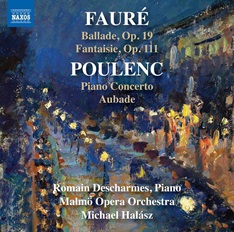Im Vergleich zu William Youn in seiner rezenten Aufnahme für Sony spielt Romain Descharmes in der Fauré-Ballade langsamer, und vor allem schlendert er zielloser und erreicht weder Youns Rhetorik noch seine gestalterische Fantasie. So bleibt diese schöne Ballade letztlich etwas banal.
Auch im Konzert von Francis Poulenc kann mich das Gespann Descharnes-Halasz nicht überzeugen. Die zum Vergleich angehörten Einspielungen von Gabriel Tacchino und Georges Prêtre sowie Pascal Rogé und Charles Dutoit klingen weitaus inspirierter.
In der Fantasie wiederum ist William Youn dem Franzosen Descharmes weit überlegen, wenn es um phantasievolles Gestalten und vor allem um Poesie geht.
Die Enttäuschung weicht auch nicht in der Aubade, dem Choreographischen Konzert für 8 Instrumente und Klavier. Halasz mag den theatralischen Aspekt der Musik gut herausstreichen, aber im Vergleich zu Dutoit etwa bleibt er der Musik viele an Eleganz schuldig, die gerade ein Pluspunkt der Decca-Aufnahme von Dutoit ist (mit dem viel subtileren Rogé am Klavier).
Compared to William Youn in his recent recording for Sony, Romain Descharmes plays the Fauré Ballade more slowly and, above all, more aimlessly, reaching neither Youn’s rhetoric nor his creative imagination. As a result, this beautiful ballad remains somewhat banal.
In the concerto by Francis Poulenc, the Descharnes-Halasz duo also fails to convince. The recordings of Gabriel Tacchino and Georges Prêtre as well as Pascal Rogé and Charles Dutoit, which I listened to for comparison, sound much more inspired.
In the Fantasy, William Youn is far superior to Descharmes when it comes to imaginative playing and, above all, poetry. The disappointment continues in the Aubade, a Choreographic Concerto for 8 instruments and piano. Halasz may emphasize the theatrical aspect of the music well, but compared to Dutoit, for example, he leaves much of the music lacking in elegance, which is precisely one of the plus points of Dutoit’s Decca recording (with the much more subtle Rogé at the piano).
https://www.pizzicato.lu/international-und-doch-so-genuin-franzosisch/



















